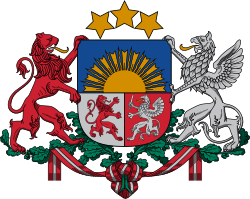 |
|---|
This is a list of political parties in Latvia. Latvia has a multi-party system, where often no one party has a chance of gaining power alone, and parties must work with each other to form coalition governments.
 |
|---|
This is a list of political parties in Latvia. Latvia has a multi-party system, where often no one party has a chance of gaining power alone, and parties must work with each other to form coalition governments.
The following are parties represented in the Saeima or the European Parliament.